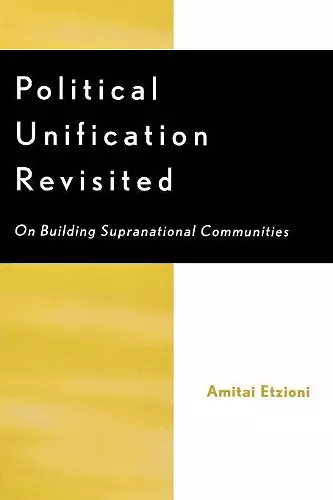Political Unification Revisited
On Building Supranational Communities
Format:Paperback
Publisher:Lexington Books
Published:21st Nov '01
Currently unavailable, and unfortunately no date known when it will be back

Can independent nations unify politically? Amitai Etzioni raised this searching question in his seminal 1965 book, Political Unification: A Comparative Study of Leaders and Forces. In this revised edition—now with an extensive new introduction—Etzioni convincingly argues that the experiment of collective self-determination is the only viable replacement for a perilously overloaded international system. This fascinating work debates the limitations of informal networks of governance, transnational agencies and cross-nation bonding—including the grand experiment of the European Union—to argue that only a truly transcendent supranational community can effectively succeed the nation-state. He doubts whether the traditional system of international relations can withstand the threat of transnational forces. Old-fashioned diplomacy can neither prevent weapons of mass destruction and hate material moving easily across national borders, nor deal with mass cross-border immigration in the wake of civil war and the rise of political and ethnic separatism. Political Unification Revisited is essential reading for political scientists and scholars of international law and international relations seeking to navigate the path from national sovereignty to world government in the 21st century..
Political Unification Revisited is a highly original book with something old and something new, that is, with a new, long introduction that situates the bulk of the book, published in the l960s, within contemporary debates about the need for globaland regional government. The 1960s part of the book has stood the test of time, with its subtle analyses of the demands involved in building federations of nation-states illustrated through four case studies. The contemporary introduction provides fresh insights on the one federation of the four that lasted, the EU, while making compelling arguments about the unsustainability of a federation that remains stuck halfway to a real regional government. For Etzioni, the problem for the EU, as for any other regional or even global government—to be distinguished from governance arrangement—is that supranational political institutions need to be accompanied by moral dialogues that speak to the creation of a common core of communal values and bonds, without which any federation will founder. Etzioni makes this point eloquently, as he revisits his earlier work while updating it, to show that while well-constructed political institutions are essential, they cannot succeed without solid moral communities to underpi -- Vivien A. Schmidt, Jean Monnet Professor of European Integration and Professor of Political Science and International Relations, Pardee School of Global Studies, Boston University
This reissued classic is recommended for upper-division undergraduate through professional collections. * CHOICE *
Truly a classic. . . . An indispensable tool for students, a constant reference for scholars, and a source of foreknowledge for policy makers. . . . The depth and range of Professor Etzioni's scholarship provide the reader with unique insights. -- Simon Serfaty, Old Dominion University; director of European Studies, Center for Strategic & International Studies
Political Unification Revisited is a highly original book with something old and something new, that is, with a new, long introduction that situates the bulk of the book, published in the l960s, within contemporary debates about the need for global and regional government. The 1960s part of the book has stood the test of time, with its subtle analyses of the demands involved in building federations of nation-states illustrated through four case studies. The contemporary introduction provides fresh insights on the one federation of the four that lasted, the EU, while making compelling arguments about the unsustainability of a federation that remains stuck halfway to a real regional government. For Etzioni, the problem for the EU, as for any other regional or even global government—to be distinguished from governance arrangement—is that supranational political institutions need to be accompanied by moral dialogues that speak to the creation of a common core of communal values and bonds, without which any federation will founder. Etzioni makes this point eloquently, as he revisits his earlier work while updating it, to show that while well-constructed political institutions are essential, they cannot succeed without solid moral communities to underpin them. -- Vivien A. Schmidt, Jean Monnet Professor of European Integration and Professor of Political Science and International Relations, Pardee School of Global Studies, Boston University
ISBN: 9780739102732
Dimensions: 228mm x 149mm x 30mm
Weight: 603g
412 pages